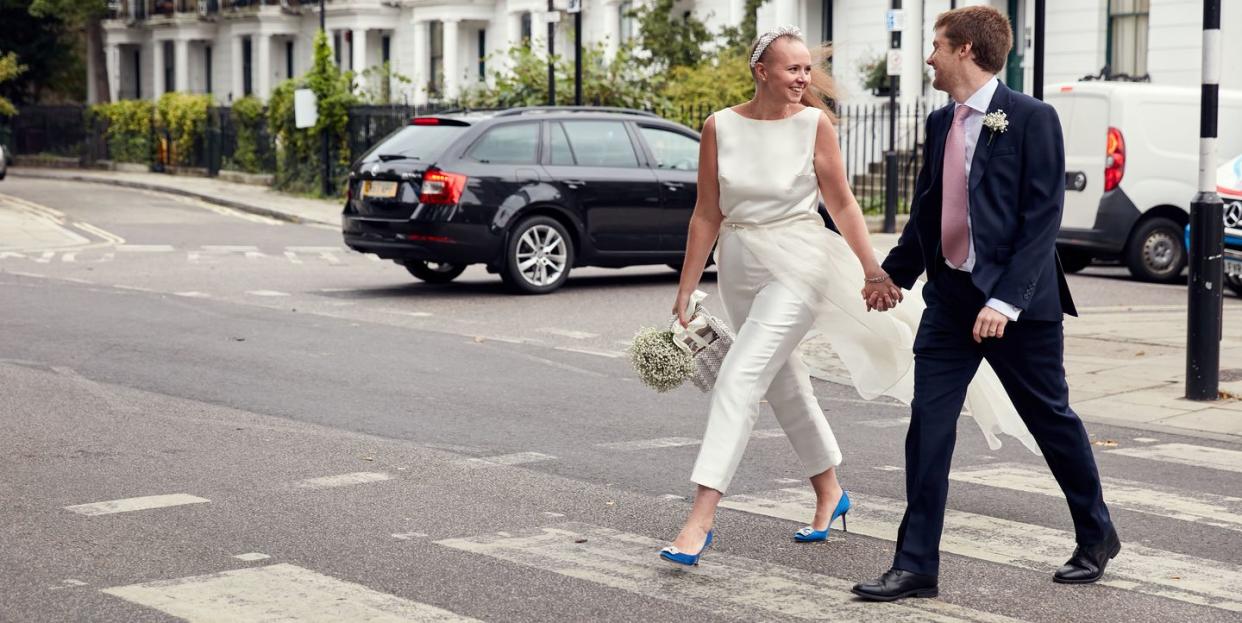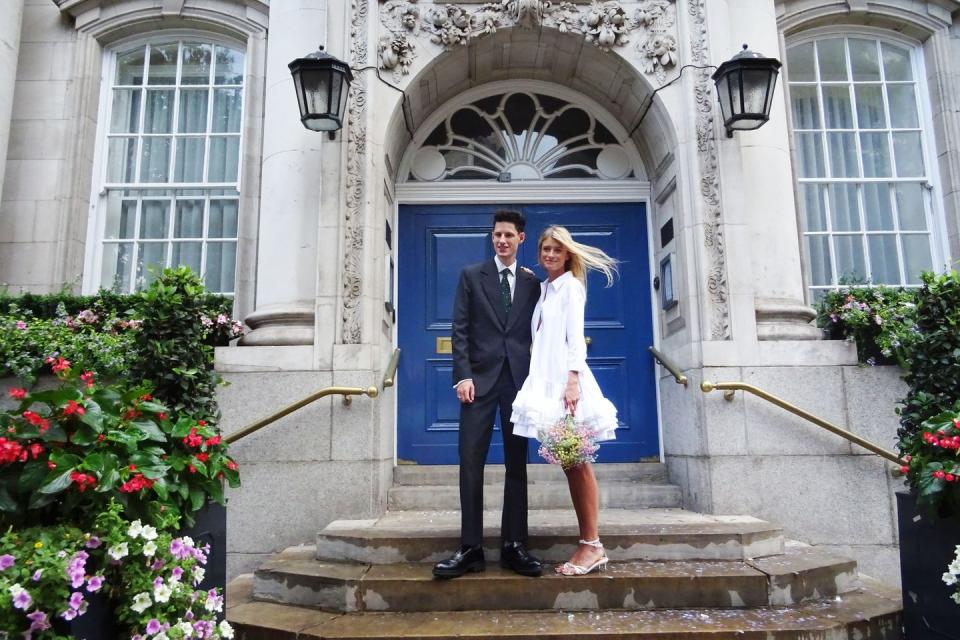Could the intimate weddings of 2020 be a lesson for future brides?

This time last year, I entered hen do retirement. Enough of the forced fun, humiliation, expense and competition to be the best friend ever. I am too old to still be doing things I don’t want to do with people I often don’t know or like. Between my friends and I, we have enough hen do horror stories for a Halloween all-nighter. There was the friend who had to pay close to £1,000 for a hen do in Ibiza, another whose broke her wrist after being asked to take part in a human hen pyramid and another who was forced to sell clothes on eBay so she didn’t have to choose between a planned holiday and her friend’s hen. Don’t even get me started on being a bridesmaid – nothing with the word maid in it rarely leads to any good.
For me, hen dos had become a precursor to an inevitably even bigger event – the wedding itself, which required more travel, money and another weekend (possibly even annual leave for the couples who marry abroad or those who understandably and yet punishingly for the guests want to save money by choosing a mid-week date). I was tired of wearing bridesmaid dresses that made me look like Johnny Vegas and the #bridesquad WhatsApp groups that drained your battery within 15 minutes. I was tired of how contrived, Instagram-inspired and elaborate the mechanics of weddings had become. I was tired that anything to do with love could possibly be related to the word ‘mechanics’. I had developed what I shall call wedding fatigue – a surprising turn of events for someone who loves romance and schmaltziness so much that she sometimes watches Love Actually in July for ‘a treat’. It was not the reason for the wedding that had turned me into a wedding grinch, but rather that the precise reason for them had become buried under the enormity of the build-up and event. Watching my friends becoming increasingly stressed and overstretched as they planned their what was supposed to be the happiest day of their lives only added to my resentment.
Then this year, wedding season was put on hold, thanks to a virus that at this point needs no introduction. Many brides-to-be delayed their plans until later on in the year or until 2021 when the coast might be clear (hopefully). Weddings, like so many other things we used to take for granted, felt like a luxurious part of the ‘old world’ that felt utterly incongruous with a pandemic. But then on 4 July, the British government said that weddings of up to 30 were allowed again (in September that figure was halved and now the rules depend on what part of the tier system your venue falls under), and a wonderful thing happened – slowly but surely a smattering of engaged couples decided that, actually, what was important wasn’t the party to celebrate their marriage, but the marriage itself.
Gone were the hen dos, the overblown build-up and stress for the betrothed. Instead, we saw couples get married on a stoop in New York giving their whole street a reason to get out on the pavement and dance in their masks, and others who quietly made it official at registry offices watched by happily tearful friends on Zoom. We saw a new form of wedding photos, where guests smiled into cameras while stood the recommended social distance apart. One Israeli couple painted nail polish onto their medical gloves as they exchanged their vows. Another tied the knot at a drive-in wedding where guests watched on big screens from their cars. There have been first dances take place in carparks and wedding officiants who have married people over FaceTime. Couples who wanted to get married found a way of doing so.
Fashion publicist Sabina Szymura had been dating her partner for 13 years, and felt that – regardless of a pandemic – it was “about time”. The uncertainty of when she and her now husband would actually be able to get married made her decide against postponing and to become husband and wife sooner rather than later. They married in Chelsea Town Hall, where her husband’s parents had tied the knot decades before. Afterwards, the newlyweds had dinner and drinks nearby with their closest loved ones. While it was touch and go whether her Polish parents would be able to attend due to travel restrictions, everything worked out and Szymura was grateful for the lack of stress. “I didn’t have to worry about whether or not everyone was ok on the day and if anything was going to go wrong,” she told us. “With so few parts to the day, it relied only on a few great things coming together.” Perhaps surprisingly for a seasoned fashion PR, she spent just 25 minutes getting ready and explains that there was relief in not having to organise an enormous celebration. “Making plans and arrangements during the lockdown wasn’t ideal,” she admits. “So, we decided on everything around three weeks before the wedding, from the dress made by our closest friend and our witness Molly Goddard to the dinner venue.”

Caroline Allen, also a London-based fashion publicist, planned on marrying her long-term boyfriend in October in front of 140 people, but – as the pandemic continued – she was forced to think outside the box. Eventually, she chose to bring her wedding forward to September with just eight guests present. “Fundamentally, we realised we just wanted to get married, and that was the main drive behind re-planning a smaller wedding,” explains Allen. “We were allowed eight guests for the service, which luckily covered immediate family and a photographer. We had our bridal parties meet us outside the venue for a champagne toast, to throw confetti and carry the train of my skirt. The day was filled with so much joy, love and laughter.”
It’s hard to argue that seeing a couple tie the knot against all odds whether on social media, Zoom or in real life is an instant mood-booster. Allen says that she took real pleasure in giving her nearest and dearest a day of celebration and joyfulness amid a gloomy, anxiety-inducing few months. “With the year everyone has had, and the limited opportunities to create memories with those closest to us, celebrating a wedding really was the best way to lift everyone's spirits,” she says. “It was especially amazing to see our families spending time together and enjoying becoming one unit. We were both overcome with emotion due to the sheer amount of love we received and has caused a huge turnaround to how we will look back on 2020 in years to come.”

Of course, small weddings are not entirely new. Some brides recognised the advantages of a more intimate celebration long before Covid-19 arrived, including fashion journalist Scarlett Conlon who married her husband in 2015 in Italy with just 40 guests. “Neither of us wanted it to become bigger than the reason we were doing it, as in sharing our vows,” she says. “Anything that started to get complicated in the planning stages, we got rid of. In the end, the actual day was so relaxing, and we could really enjoy feeling like guests at our own wedding. By the same token, our guests were super relaxed before and during, so it was a win-win all round."
Pandemic or otherwise, couples who have small weddings agree that there is a freedom that comes with not having to plan a huge ceremony and party – they are able to spend time with their guests and not worry about different facets of the day coming together. “Neither of us like fuss or stress, which is probably impossible to totally avoid with a huge event of any kind,” says Conlon. “If there’s one day you need that the least, surely it’s your wedding day.”
If there’s one thing 2020 has given us is time to think. Covid-19 has pushed reset on so many facets of our lives that were in need of reconsideration, from our approach to fast fashion and how much we really need to where we live and how we conduct our working lives. Two people telling the world that they love each other enough to spend the rest of their lives together is arguably the best reason for a celebration, but few could argue that the wedding industry had become overblown and unsustainable. When the figures tell us that the average UK wedding costs over £30,000, it’s time for a rethink. The pandemic has shifted our focus back to the reason behind the extravagant party; it’s not the how you marry that matters so much as why. People will always want to party like it’s 1999 when it comes to marriage, and for some an extravagant celebration is the best way of doing so, but what this year has proved is small weddings don't mean less love.
“Covid couples have shown that weddings can be planned at a much quicker pace with a far reduced budget and this is something that I'm sure will carry over into the future," says Allen. "The pandemic has made everyone re-evaluate what is important to them, and what their priorities are, and this is no different for couples as they approach their big day.”
What we’ve seen is that, in dark times, we don’t need big weddings and the rigmarole that comes with them. What we do need is faith-restoring, against-all-odds determined love; the kind that looks at a pandemic square in the face and says, ‘not today Satan’ and goes off and gets hitched on their own intimate terms. It's enough to cure even this writer of her wedding fatigue.
In need of some at-home inspiration? Sign up to our free weekly newsletter for skincare and self-care, the latest cultural hits to read and download, and the little luxuries that make staying in so much more satisfying.
You Might Also Like

 Yahoo News
Yahoo News 
